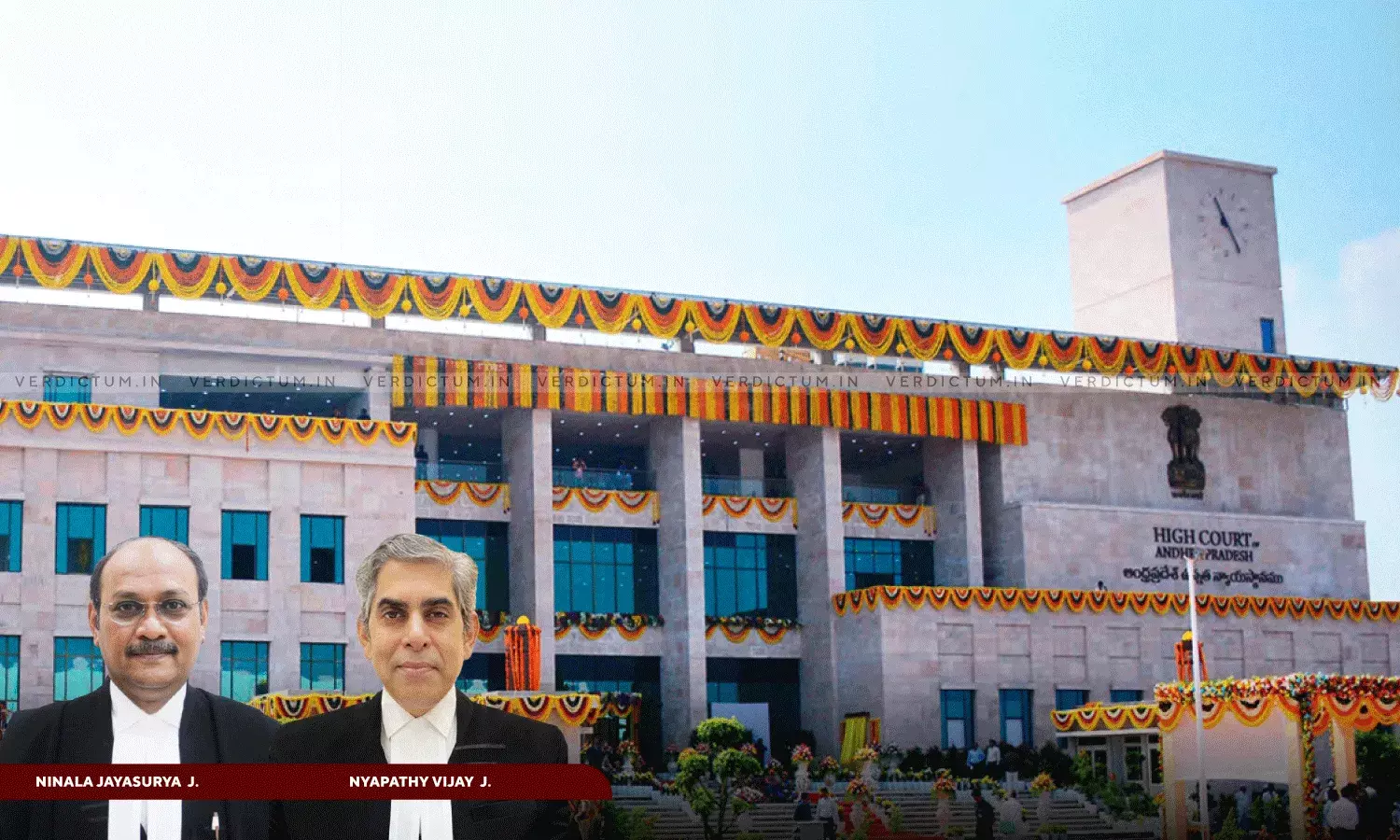Order 38 Rule 5 CPC Doesn’t Debar Court To Pass Ex-Parte Order Of Attachment If There’s Such Requirement: Andhra Pradesh HC

The Andhra Pradesh High Court observed that Order 38 Rule 5 of the Civil Procedure Code (CPC) does not debar the Court to pass an ex parte Order of Attachment if there is a requirement of doing the same.
The Court observed thus in an Appeal filed under Section 37 of the Arbitration and Conciliation Act, 1996 (A&C Act), questioning the Order of the Single Judge.
A Division Bench comprising Justice Ninala Jayasurya and Justice Nyapathy Vijay elucidated, “The Order 38 Rule 5 CPC does not debar the Court to pass ex parte order of attachment if the Court is of the opinion that there is a requirement of doing so as the defendant might dispose of the property in the interregnum. On attachment, the defendant can appear before the Court and show cause as to why attachment should be removed.”
Senior Advocate B.S. Prasad and Advocate N. Siva Reddy appeared for the Petitioner while Senior Advocate O. Manohar Reddy appeared for the Respondents.
Factual Background -
The Appellant and Respondent companies, registered in India and Hong Kong, respectively, executed a contract in 2023 for the sale/purchase of 55,000 WMT (+/- 10% WMT) iron ore fines. The contract specified that the iron ore would have an 'Fe' content of 56%. However, upon inspection by CIQ at the discharge port, the 'Fe' content was found to be 52.21%, triggering a price renegotiation clause. The parties agreed to appoint a third-party agency to conduct dynamic re-sampling and re-inspection, which confirmed the lower 'Fe' content. The Respondent sought a price adjustment, claiming a refund of US $2,001,404.58. The Appellant failed to respond or settle the claim.
Pursuantly, the Respondent filed an Application under Section 9(1) of A&C Act, seeking attachment of the Appellant's iron ore valued at US$2,500,000, lying at Vizag Port, pending arbitration at SIAC, Singapore. The Single Judge granted an interim Order, directing the Appellant to furnish security for US $2,423,404.58 within 48 hours or face attachment. The Appellant appealed to a Division Bench, which disposed of the Appeal without interfering with the Attachment Order. The Appellant denied the Respondent's contentions, arguing that Order 38 Rule 5 CPC applies, requiring higher standards for attachment. The Single Judge dismissed the Appellant's pleas, and hence, the case was before the Division Bench.
The High Court after hearing the arguments from both sides, said, “In this case, the interim order of the learned single Judge directing conditional attachment dated 27.06.2024 provides an opportunity to the Appellant to furnish security in favor of the Respondent No.1 for a sum of USD 2,423,404.58 within 48 hours of receiving of the notice, failing which 50,000 WMT iron ore fines were attached. Therefore, the learned single Judge adhered to the conventional principle of prima facie case, balance of convenience and adhered to the procedure prescribed.”
Furthermore, the Court took note of the fact that the parties entered into an agreement and 96% of the contract value was received on the basis of ‘Fe’ content in the cargo being more than 56%. It added that the ‘Fe” content in the cargo was checked again at the port of discharge as provided in the contract and the results showed that the ‘Fe’ content was 52.21% and the contract provides that the ‘Fe’ content at the port of unloading at China would be final.
“As the test results of ‘Fe’ content in the cargo showed significant variation, Bureau Veritas (BV) was agreed to be the third umpire by the parties hereto for re-sampling and re-inspection and that the Bureau Veritas (BV) would issue certificate of inspection. The Inspection report of Bureau Veritas (BV) dated 30.4.2024 shows that the ‘Fe’ content was hovering between 52%-53%”, it also noted.
The Court added that, since two independent test reports i.e., at the port of unloading and by Bureau Veritas (BV) show that the ‘Fe’ content in the cargo is between 52%-53%, but the Appellant having received 96% of the contract value on the premise of ‘Fe’ content in the cargo being more than 56%, the claim of the Respondent cannot be brushed aside as their monies are with the Appellant.
“Though the Appellant contended that the net worth of the company is Rs. 91 crores and is not a fly-by-night company, no physical assets or any other alternative security is provided either before the learned single Judge or before this Court. The plea of the Respondent No.1 in the application at paragraph 26(b) as extracted above that the appellant has no other asset than the iron ore attached appears not without any basis”, it said.
The Court, therefore, concluded that in the absence of any alternative asset provided by the Appellant and in the light of undisputed fact that the Appellant has received 96% of the contract value, the interim protection should be given to the Respondent so that the Arbitral Award if passed in its favour, does not become unrealizable.
Accordingly, the High Court dismissed the Appeal and upheld the impugned Order.
Cause Title- Tuf Metallurgical Private Limited v. Bst Hk Limited and Others


